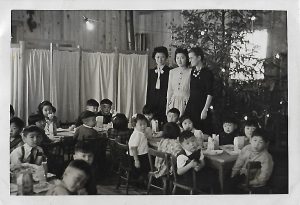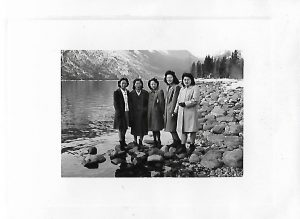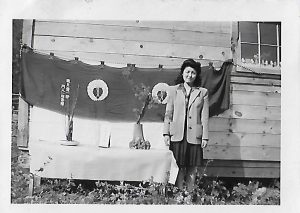I recorded the talk that my girlfriend and I had with Grandma so that I could reference back to it if I needed to. I’ll likely include the recording elsewhere in my portfolio, and I strongly encourage you to never listen to it. I say this not because the talk was uninteresting or because I come off badly in it, but because Grandma needed a lot of visual prompting from her photo album in order to trigger her memories, which doesn’t make for particularly riveting or useful audio. But receiving prompts in such a way does create some interesting gaps in her historical memory. While we were looking through the photo albums, she would see a person’s face and usually be able to tell me their name, how she knew them, and where they wound up after internment. However, at one point in the discussion, she mentioned that she frequently walked between camps for work. When I asked if people walking between camps was common, or if the RCMP needed to approve such exchanges, she was not able to remember. Unpleasant and traumatic memories are not usually preserved in family photo albums, which creates something of a bias when we rely on those albums to set the historical narrative. The album makes internment look like more of a summer camp than a prison. There are dozens of photos of her and her friends hanging out at the Slocan Lake beach, there are several photos of her kindergarten class celebrating Christmas, there are even photos of her participating in an Ikebana flower arranging contest. Things like the interiors of the houses, which were overcrowded and extremely cold in the wintertime, are unpleasant and as such are understandably absent from the book. Happy photos make you think of happy times, and not about your rights that were violated, or your property that was confiscated, or the friends you were unable to see. Towards the end of our conversation, Grandma’s mood was one of fond nostalgia, and it was only after some introspection that she came around to saying, “it was pretty terrible what they did to us”. All of this raises questions that I’m not equipped to answer in this reflection; to what extent is does an oral source’s historical distance from the event in question change their perspective, and as a result, the facts they provide? If I had asked the same questions to the same person in 1950 when the memories were still fresh, would the account have been significantly different? Assuming that the accounts would be different and potentially even incompatible, which account is more true? How do we account for this in our interpretations of the facts provided?

Christmas 1945 in Bayfarm Kindergarten

Grandma and friends at Slocan Lake

Grandma posing with her entry to the Ikebana contest. She did not win.